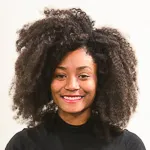In “The Problem with Dove’s ‘Love Your Curls’ Campaign,” Kinsey Clarke convincingly writes about how Dove co-opted the natural hair movement and then undermined the movement by primarily featuring women and girls with looser textures. Clarke stated that white-presenting and mixed-race subjects will receive positive reinforcement for their “good hair,” while girls with kinkier textures will face the most scrutiny.
Clarke’s insight is honest and truthful. From the time of infancy, many Black girls are assessed on a beauty spectrum that is drenched in white beauty politics — whether it is commentary on skin tones, as seen in the documentaries Light Girls and Dark Girls, or emphasis on certain textures of hair being better or more beautiful than others, with looser textures being the most desired. Dove’s exclusion of women with kinkier and tighter textures and curls is to be expected. Even with a Black natural hair movement, there will always be the erasure of blackness by outside corporate forces.
Their incentive as a company to make a commercial about curls is to try to capitalize out of a growing movement spurred by Black women of all textures. They can make dozens of sentimental advertisements with cute kids, and the monetary motivations by behind it all will not change. Dove was not making any efforts to explicitly charter to a textured audience before the movement had an impact. And now after inserting itself into the conversation, they only recreated the oppression the movement was resisting.
The natural hair movement is about acceptance of Black beauty in all shades and hair textures. It purposely ignores the white beauty standards and uplifts black beauty. It includes all of the women featured in the commercial, and it also includes the girls who weren’t featured in the commercial and felt invisible. They need to learn to accept their curls, kinks and naps, too. It took me a while to accept mine.
The beauty of the natural hair movement is that the pioneers and major faces of the movement are aware of the cultural factors at play. This is the reason the movement has been extremely successful thus far, and it is being co-opted because Black people have tremendous buying power. According to the Huffington Post, the Black hair industry is worth at an estimated $684 million dollars, not including “general market brands, weaves, extensions, wigs, independent beauty supply stores, distributors, e-commerce, styling tools and appliances.” If these figures factored in, the market is estimated to be worth $500 billion. With these figures in mind, it is no surprise that Dove wanted to weigh in.
Furthermore, the natural hair movement took off with the force of Black women entrepreneurs. Natural hair pioneer Lisa Price started the company Carol’s Daughter in her kitchen. Last year, L’Oreal USA acquired the company, and according to CEO Frederic Roze, “Carol’s Daughter possesses an expertise in the multicultural consumer segment, a rapidly expanding market that represents an important growth in the beauty industry.”
The Black dollar has power, and we need to acknowledge it because companies are capitalizing on us. The natural hair movement started without big corporations like Pantene Pro-V, Dove and Suave trying to monopolize off of the buying power of Black women. There are natural hair companies started by Black women who make products that are for women of all textures on the kinky, curly, straight spectrum.
Support those businesses that fully understand the movement and believe that all shades and textures of blackness are beautiful. When Dove misses the mark and makes an advertisement that is not for us, let’s not take it personally. This movement is not about them. This movement has existed without them. This movement can transcend the products and big companies trying to make a profit.
Buy Black natural hair products from companies that care about kinky and curly textures. The market for relaxers, a treatment that chemically makes hair straight, has declined incredibly. The natural hair movement is about acceptance and it is here to stay. The Black natural hair companies have been carrying the natural hair community thus far, providing tools, statin caps, shampoos, conditioners and treatment for natural-haired people of the Diaspora. It was a good move for Dove to try to reach a larger audience of White consumers with curls who aren’t tuned in with the natural hair movement. They need products and acceptance, too. They can find it in our movement, but not at the expense of white beauty standards erasing our kinks and curls in all their glory.
Contact Mysia Anderson at mysia ‘at’ stanford.edu.
